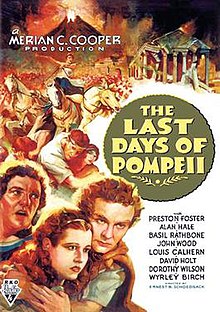The Last Days of Pompeii (1935 film)
| The Last Days of Pompeii | |
|---|---|

1935 US Theatrical Poster
|
|
| Directed by |
Ernest B. Schoedsack Merian C. Cooper |
| Produced by | Merian C. Cooper |
| Written by | Ruth Rose |
| Story by | James Ashmore Creelman |
| Based on |
The Last Days of Pompeii by Edward Bulwer-Lytton |
| Starring |
Preston Foster Alan Hale Basil Rathbone John Wood David Holt Dorothy Wilson |
| Music by | Roy Webb |
| Cinematography |
J. Roy Hunt Jack Cardiff (uncredited) |
| Edited by | Archie Marshek |
|
Production
company |
|
| Distributed by | RKO Radio Pictures |
|
Release date
|
|
|
Running time
|
96 minutes |
| Country | United States |
| Language | English |
| Budget | $818,000 |
| Box office | $980,000 |
The Last Days of Pompeii (1935) is an RKO Radio Pictures film starring Preston Foster and directed by Ernest B. Schoedsack and Merian C. Cooper, creators of the original King Kong. Although inspired by the novel of the same name by Edward Bulwer-Lytton, the film has virtually nothing to do with the book.
In the time of Jesus Christ, blacksmith Marcus (Preston Foster) is content with his life, beautiful wife Julia (Gloria Shea) and six-month-old son. However, when Julia and their child are run down by a chariot in the streets of Pompeii, Marcus spends the little money he has to pay for a doctor and medicine. Needing more, in desperation, he becomes a gladiator. He wins his fight, but in vain; his wife and child die.
Blaming his poverty, he becomes an embittered professional gladiator and grows wealthier with each victory. In one match, he kills his opponent, only to discover he has orphaned a young boy named Flavius (David Holt). Full of remorse, he adopts the boy and purchases a slave, Leaster (Wyrley Birch), to tutor him. However, the added responsibility makes him too cautious in the arena, and he is defeated and injured. The injury ends his second career.
When Cleon (William V. Mong), a slave dealer, offers him a job, Marcus is at first contemptuous, but eventually takes it. He raids an African village for slaves, where a father battles Marcus' raiders until his young son's life is threatened and he is forced to surrender. Marcus identifies with the father's grief at being unable to protect his son. He stops slaving and turns to trading instead.
One day, Marcus rescues a fortune teller, who foretells that Flavius will be saved by the greatest man in Judea. Marcus and Flavius travel to Jerusalem to see the man that Marcus thinks fits that description: Pontius Pilate (Basil Rathbone), the Roman governor. At an inn along the way, a man tells him that the greatest man is staying in the stable (similar to the one in which he was born), but Marcus does not believe him.
...
Wikipedia
